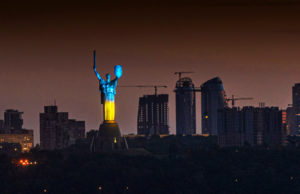In the early hours of 24 February 2022, Russian troops entered Ukraine. Later that day, the Russian navy captured Snake Island in Ukraine’s Black Sea waters. When the news broke, oil and European gas prices soared. The war that began, and continues to this day, has remade the continent of Europe, forcing European leaders to face the meaning of Ukraine’s national independence and accept Russia as a geopolitical antagonist rather than a critical energy supplier.
This realignment was most profound in the country that sits at modern Europe’s heart. In the event of the invasion, the stakes for Germany involved not only one unopened pipeline — the already-controversial Nord Stream 2 — but its 50-year commitment to rapprochement with Moscow. Within 72 hours, Chancellor Olaf Scholz promised to send German weapons to Ukraine, establish a €100 billion fund to increase military expenditure, and end energy dependency on Russia by opening the country to sea-borne gas. Since Putin had, Scholz told the German parliament, “demolish[ed] the European security order that had prevailed for almost half a century since the Helsinki Final Act” in 1975, everything had changed. “We are,” Scholz said, “living through a watershed era [eine Zeitenwende] … mean[ing] that the world afterwards will no longer be the same as the world before.”
In part the German chancellor was right. But Scholz’s version of why European history fractured in February 2022 also distorts reality. Self-evidently, the European security order before Russia’s war was nothing like the one that prevailed in the mid-Seventies: six new European states stood in the former western Soviet Union. Having no prior history of peacetime independence, Ukraine’s emergence in 1991 as Europe’s largest territorial state had constituted an extraordinary change.
But the new Ukrainian nation-state was always geopolitically precarious. Since at least 2009, Putin had openly denied the legitimacy of its existence. In the treaties Ukraine signed with Moscow during the Nineties, it ceded Russian military rights in Crimea. Then, in 2014, it lost the Crimean peninsula and entered a war against Russian-backed separatist rebels in the south-east of the country. If Russia’s invasion severed the present from the past, the shock was the scale of suffering Putin was willing to inflict to destroy Ukraine’s viability as an independent state, amplified by the chasm between the size of his initial ambition to seize power in Kyiv and a military mobilisation entirely inadequate to the task.
The unintended consequence for Europe is now clear: the emergence of a largely unified nation-state-in-arms with a pressing claim for EU membership that will prove hard to realise without concurrent Nato entry. Regardless of Ukraine’s prospects for entering either association with any alacrity, Ukraine’s resilience against Russia has rendered Ukrainian nationhood a crucial geopolitical fact. In a 1984 essay, the Czech novelist Milan Kundera wrote that the Ukrainian nation, “one of the great European nations… is slowly disappearing. And this enormous, almost unbelievable event is occurring without the world realising it”. Ukraine’s independence seven years afterwards only partly introduced western Europeans to Ukrainian history. But, by trying to eliminate Ukrainian nationhood, Putin has instead ensured that it has become a permanent feature of Europe with which the EU must grapple.
The post-Cold War EU relied on a measure of German-Russian reconciliation to allow for German reunification even as the eastern European states had only just successfully asserted their nationhood against the Soviet version of the imperial Russian empire. Thereafter, the Holocaust, as an end point for German nationalism and the catastrophic culmination of decades of ethnic division in eastern Europe, became pivotal to the imaginative construction of the idea of European unity. By contrast, in 2022, a state subject to the simultaneous experience of the Holocaust and Soviet mid-20th century terror became an official candidate for EU membership by fighting a defensive war for its territorial national sovereignty.
In doing so, it claimed the right to nation-build, including by suppressing minority languages in the public sphere. No aspect of this experience sits easily with the notion of the post-Maastricht EU as a post-national and peace-oriented construction. An EU that admits Ukraine as a war-formed nation-state would necessarily become a different kind of entity, one that could not be rhetorically legitimated without a new narrative about its historical purpose partially grounded in Russia’s existence as a geopolitical opponent. In Berlin and Paris, an EU with such a relationship to Europe’s resource-rich, continental-size neighbour would indeed belong to a Zeitenwende.
The existential question of Europe’s energy supply triggered by Russia’s war also raises profound questions around nationhood across the rest of Europe. As they opposed Russia in ways that jeopardised their immediate energy security, European governments resuscitated the narrative of energy sacrifice once deployed by Jimmy Carter: reduce your energy usage for the greater good. In spring 2022, the Italian prime minister, Mario Draghi, asked: “Do we want to have peace or do you want to have the air conditioning on?”
But the ghost of Carter’s political failure lingered. Palpably fearing a democratic rebellion on energy, European politicians did not ask citizens to endure too much economic pain in the name of any claim to political community — whether that community be the nation, Europe, or a democratic West. Throwing fiscal caution to the wind, European governments subsidised household fuel bills and some, notably the British and French, still faced a wave of strikes. None appeared to show qualms about European companies buying spot-market LNG already contracted to Pakistan. In Italy, Draghi’s government fell in July 2022 after Five-Star withdrew its support, charging that the former ECB president was prioritising Ukraine over reducing energy prices. Tellingly, when the subsequent general election once again saw the party uncompromised by technocratic and grand coalition politics win the largest number of seats — this time the Brothers of Italy — its leader, Giorgia Meloni, was allowed to become prime minister.
By contrast, reducing energy consumption in the name of lowering carbon emissions remained off-limits. Instead, in making a new case for the energy transition, the war emergency encouraged further the idea that economic transformation could recreate the cross-class interest in national manufacturing production lost from the Seventies. Yet the prospects for realising this ambition were much more propitious across the Atlantic. With the Inflation Reduction Act, passed in August 2022, American climate policy near explicitly became a political bulwark against another 2016-style shock where Trump or a Trump-style candidate again won by appealing to the losers of American deindustrialisation. In contrast to its New Deal predecessor, this federal intervention is explicitly racially inclusive in its conception of nationhood. Indeed, for the Biden administration, it is an act of reparation for the restrictive American nationhood of the past as well as an attempt at restoring the New Deal-originating idea of economic nationhood.
Whether by reshoring manufacturing production it can succeed on its own terms is open to question. But the fact that the United States under Democratic Party rule in 2022 entered the same political space European governments had already sought to occupy in 2019 with their Net Zero 2050 commitments now constrains European ambitions. The American move establishes a competitive geopolitical contest between Western countries around using energy change to rebuild nationhood in which European states and the EU are disadvantaged by higher fossil-fuel energy costs and American financial power. Already the failure of Boris Johnson’s government, which bet its post-Brexit “levelling-up agenda” on investment in low-carbon sectors, testifies to the problem.
With the Inflation Reduction Act, the stakes for Britain in securing a post-Brexit free-trade agreement with the United States are now quite possibly high enough to force a future choice between British companies’ presence in US-centred low-carbon supply chains and the domestic burden of accepting Washington’s trade terms. Even in the United States, reconfiguring energy production towards national self-sufficiency cannot happen quickly enough to be democratically transformative. As a response to Trump’s 2016 insurgency candidacy, this project leaves the border and citizenship issues untouched. In betting on rapidly building a low-carbon America, the Biden administration has also left itself open to the charge that it is subordinating present energy needs to an unrealisable, future-oriented project to the benefit of those corporations that procure the available subsidies.
Here, the fundamental problems that the energy transition presents have not shifted. Of the transformative forces unleashed by Russia’s war, game-changing technological breakthroughs of the kind necessary for a low-carbon energy future, especially on the storage of electricity, was not one. Following hard on the 2021 China gas shock, the energy trade disruption caused by Russia’s war, meanwhile, intensified the separate problem of the energy present. The 2022 crisis demonstrated just how politically hard it is for European politicians to reduce the expectations for consumption formed in a prior geopolitical era, or ask their citizens to engage with the energy poverty of people in many non-Western parts of the world.
If Russia’s war has changed the prior democratic predicaments around energy, it is by spreading energy consciousness, including letting loose the spectre of future energy scarcity in polities premised on energy abundance. Where, in the West, energy consciousness was acute for those exercising power but often weak among citizens, the war means these citizens now better understand their material aspirations and fears as energy demands and anxieties. They do so at a time when Western democracies generally have still not recovered from the blows delivered by the 2008 crash — even without a new round of bank interventions in March 2023 — and when in France violent street protest has become a persistent feature of expressed discontent.
In principle, greater energy consciousness could loosen the technocratic logic behind the original European formulation of realising an energy revolution by 2050. But it is more likely to expose the chasm between the interests everyone shares in facing climate change and the inequalities that will come from electrifying personal transport and that are always generated by high fossil-fuel prices. In this future, energy will not be a subterranean source of political disorder, as in the first two decades of the 21st century, but the principal currency of it.
This is an edited extract from the paperback of Disorder, (Oxford University Press) by Helen Thompson.
Disclaimer
Some of the posts we share are controversial and we do not necessarily agree with them in the whole extend. Sometimes we agree with the content or part of it but we do not agree with the narration or language. Nevertheless we find them somehow interesting, valuable and/or informative or we share them, because we strongly believe in freedom of speech, free press and journalism. We strongly encourage you to have a critical approach to all the content, do your own research and analysis to build your own opinion.
We would be glad to have your feedback.
Source: UnHerd Read the original article here: https://unherd.com/



